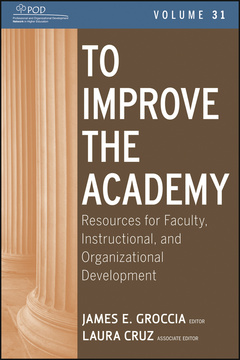To Improve the Academy, Volume 31 Resources for Faculty, Instructional, and Organizational Development JB - Anker Series
Coordonnateur : Groccia James E.

An annual publication of the Professional and Organizational Development Network in Higher Education (POD), To Improve the Academy offers a resource for improvement in higher education to faculty and instructional development staff, department chairs, faculty, deans, student services staff, chief academic officers, and educational consultants.
Contents include:
- Professional development for geographically dispersed faculty
- Implementing a learning consortium for communication and change
- Faculty engagement in program-level outcomes assessment
- What educational developers need to know about faculty-artists
- Exploring the spiritual roots of midcareer faculty
- Raising funds from faculty for faculty development centers
- Mentoring in higher education
- Tough-love consulting in order to effect change
- Research on the impact of educational development
- Examining effective faculty practice
- Insights on millennial students
- Contemplative pedagogy of teaching and learning centers
- Faculty and student perspectives on course evaluation terminology
- Questions about student ratings
- Small-group individual diagnosis to improve online instruction
- Supporting international faculty
- Complex ecologies of diversity, identity, teaching, and learning
- Organizational strategies for fostering faculty racial inclusion
- The truth about students' capacity for multitasking
- Tweeting: the 2011 POD HBCUFDN Conference Twitter backchannel
- Designing active learning with flexible technology
About the Authors xiii
Preface xxix
Acknowledgments xxxv
Ethical Guidelines for Educational Developers xxxvii
PART ONE
Broadening Our Scope
1. Professional Development for Geographically
Dispersed Faculty: Emerging Trends, Organizational Challenges, and Considerations for the Future 3
Emily Donnelli-Sallee, Amber Dailey-Hebert, B. Jean Mandernach
2 Implementing a University Learning Consortium for Shared Communication and Proactive Campus Change 21
David W. Schumann, Dorian Stiefel, Michelle Corvette, Chutney W. Guyton
3 Faculty Engagement in Program-Level Outcomes
Assessment: A Learning Process 37
Elizabeth L. Evans
PART TWO
Reaching Out to New Audiences
4 What Educational Developers Need to Know About Faculty-Artists in the Academy 55
Natasha Haugnes, Hoag Holmgren, Martin Springborg
5 An Exploration of the Spiritual Roots of the Midcareer Faculty Experience 69
Virginia S. Lee, Dorothe J. Bach, Richard N. Muthiah
6 The Donors Next Door: Raising Funds from Faculty for Faculty Development Centers 85
Genevieve G. Shaker, Megan M. Palmer
PART THREE
Building Effective Relationships
7 The Gentle Art of Mentoring in Higher Education: Facilitating Success in the Academic World 103
Nancy H. Barry
8 Tough-Love Consulting: Using a Provocative Consultation Style to Effect Change 115
Allison P. Boye, Suzanne Tapp
9 Researching the Impact of Educational Development: Basis for Informed Practice 129
Nancy Van Note Chism, Matthew Holley, Cameron J. Harris
PART FOUR
Practicing Innovative Teaching and Learning
10 Examining Effective Faculty Practice: Teaching Clarity and Student Engagement 149
Allison BrckaLorenz, Tony Ribera, Jillian Kinzie, Eddie R. Cole
11 Millennial Students: Insights from Generational Theory and Learning Science 161
Michele DiPietro
12 Contemplative Pedagogy: The Special Role of Teaching and Learning Centers 177
Daniel Barbezat, Allison Pingree
PART FIVE
Assessing Student Learning
13 A Comparison of Faculty and Student Perspectives on Course Evaluation Terminology 195
Carol Lauer
14 Time to Raise Questions About Student Ratings 213
Linda B. Nilson
15 Using Small Group Individual Diagnosis to Improve Online Instruction 229
Jennifer H. Herman, Melissa Langridge
PART SIX
Setting a Context for Promoting Diversity
16. Supporting International Faculty: Perspectives of a Tiger Teacher Who Adapted to the American Classroom, a Colleague, and an Administrator 247
Cuiting Li, Sterling K. Wall, Marty Loy, Kelly Schoonaert
17 Understanding Intersecting Processes: Complex Ecologies of Diversity, Identity, Teaching, and Learning 261
Kristen A. Renn
18 Organizational Strategies for Fostering Faculty Racial Inclusion 277
Dannielle Joy Davis, Edward J. Brantmeier, Roben Torosyan, Hyacinth E. Findlay
PART SEVEN
Integrating Technology into Teaching, Learning, and Faculty Development
19 Please Read While Texting and Driving 295
C. Edward Watson, Krista P. Terry, Peter E. Doolittle
20 Tweeting #PODHBCU: Content and Process of the 2011 POD HBCUFDN Conference Twitter Backchannel 311
Mary C. Wright, Rachel K. Niemer, Derek Bruff, Katherine Valle
21 Collaborating with Faculty to Design Active Learning with Flexible Technology 329
Beth A. Fisher, Kathryn G. Miller, William E. Buhro, Deborah J. Frank, Regina F. Frey
THE EDITORS
James E. Groccia, former president of POD, is director of the Biggio Center for the Enhancement of Teaching and Learning and associate professor of higher education at Auburn University.
Laura Cruz is director of the Coulter Faculty Commons and associate professor of history at Western Carolina University.
Date de parution : 10-2012
Ouvrage de 400 p.
15.3x22.7 cm
Thème de To Improve the Academy :
Mots-clés :
Professional and Organizational Development Network, Professional and Organizational Development Network resource, POD resource, purpose of higher education, education and advising, education and teaching, education and leadership, education and management, higher education and advising, higher education and teaching, higher education and leadership, higher education and management, examples of higher education, resources for educational developers, human development in higher education, faculty development, higher education instructional development, higher education by organizational development



